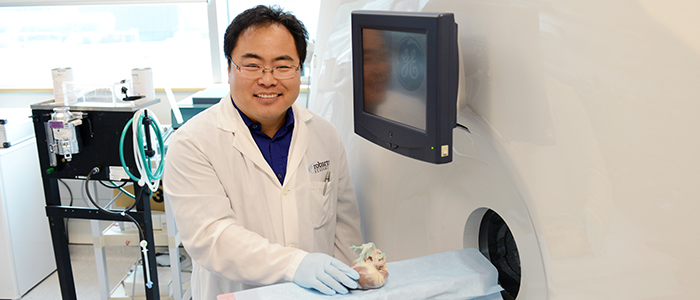Embracing the unknown

By Jesica Hurst, BA'14
Jiro Inoue, PhD, has never been afraid of the unknown. In fact, he embraces it.
Whether it’s jumping into an unfamiliar field of research with both feet or simply choosing a new ingredient to cook with every time he visits the grocery store, the postdoctoral fellow’s willingness to learn new things has led him to interesting opportunities that work out more often than not.
“Well, it only works out about half of the time with the cooking,” he said with a laugh.
Born in Japan and raised in Vancouver, Inoue has been familiar with big moves and new experiences since day one. Because of this, he didn’t shy away from travelling across the country to complete his undergraduate training at Mount Allison University in Sackville, New Brunswick.
From there, the eager academic moved to Kingston, Ontario to complete his master’s and doctoral degrees at Queen’s University, both in the area of computer science.
“One of the things I originally found and continue to find most interesting about the field of computer science is the variety of projects I can work on,” Inoue explained. “I know I can be successful in the field of medicine, but I’m not married to the application of the work — I’ve already worked with linguistics, 3D data structures and computer-assisted orthopaedic surgery.”
Under the supervision of Maria Drangova, PhD, Inoue is currently using his expertise as a computer scientist at Robarts Research Institute to help solve problems in the area of cardiology, specifically related to arrhythmia.
When a patient undergoes a catheter ablation — a procedure used to selectively destroy areas of the heart causing a heart rhythm issue — a computerized tomography (CT) scan is taken of their heart. This is normally used to show the clinician how the operation went in a non-invasive way. However, Inoue is analyzing these scans to specifically measure the thickness of patients’ left atrial walls.
“The ablation procedure itself involves basically burning the tissue, but often times surgeons do not know how much tissue they are burning,” he said. “I’m trying to figure out whether or not knowing how much tissue you are burning based on the thickness of the wall will help clinicians perform the procedure in a more precise way.”
According to Inoue, approximately 20 to 50 per cent of ablation cases fail, and they are not certain what the specific points of failure are. He hopes his research will make an impact on this and save the health care industry time, resources and money.
“I haven’t made a direct clinical impact yet, but there is potential. The idea of being able to share information that isn’t currently being used to solve an issue is very exciting,” he said.
Inoue is also excited by the ability to share ideas and opinions about important topics that can affect change. Since becoming a postdoctoral fellow, the young scholar has taken on roles with the Postdoctoral Association at Western (PAW) and the Canadian Association of Postdoctoral Scholars (CAPS) — different levels of organizations that deal with postdoctoral issues.
“Aside from putting workshops and social events together, we try to deal with larger issues that affect the postdoctoral community," he said. "For example, there is currently what you might call a build-up of postdoctoral fellows in the system, and in some fields you need to complete six- or seven-year placements in order to even stay competitive. We see this as an issue."
Inoue genuinely enjoys being a part of these discussions with postdoctoral fellows from a variety of backgrounds and research interests, mostly because it gives him the opportunity to, once again, learn something new.








